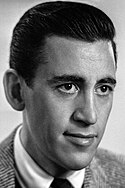J.D. Salinger Quote
They sang without instrumental accompaniment--or, more accurately in their case, without any interference. Their voices were melodious and unsentimental, almost to the point where a somewhat more denominational man than myself might, without straining, have experienced levitation. A couple of the very youngest children dragged the tempo a trifle, but in a way that only the composer's mother could have found fault with.
J.D. Salinger
They sang without instrumental accompaniment--or, more accurately in their case, without any interference. Their voices were melodious and unsentimental, almost to the point where a somewhat more denominational man than myself might, without straining, have experienced levitation. A couple of the very youngest children dragged the tempo a trifle, but in a way that only the composer's mother could have found fault with.
Related Quotes
About J.D. Salinger
Jerome David Salinger ( SAL-in-jər; January 1, 1919 – January 27, 2010) was an American author best known for his 1951 novel The Catcher in the Rye. Salinger published several short stories in Story magazine in 1940, before serving in World War II. In 1948, his critically acclaimed story "A Perfect Day for Bananafish" appeared in The New Yorker, which published much of his later work.
The Catcher in the Rye (1951) was an immediate popular success; Salinger's depiction of adolescent alienation and loss of innocence was influential, especially among adolescent readers. The novel was widely read and controversial, and its success led to public attention and scrutiny. Salinger became reclusive, publishing less frequently. He followed Catcher with a short story collection, Nine Stories (1953); Franny and Zooey (1961), a volume containing a novella and a short story; and a volume containing two novellas, Raise High the Roof Beam, Carpenters and Seymour: An Introduction (1963). Salinger's last published work, the novella Hapworth 16, 1924, appeared in The New Yorker on June 19, 1965.
Afterward, Salinger struggled with unwanted attention, including a legal battle in the 1980s with biographer Ian Hamilton and the release in the late 1990s of memoirs written by two people close to him: Joyce Maynard, an ex-lover; and his daughter, Margaret Salinger.
The Catcher in the Rye (1951) was an immediate popular success; Salinger's depiction of adolescent alienation and loss of innocence was influential, especially among adolescent readers. The novel was widely read and controversial, and its success led to public attention and scrutiny. Salinger became reclusive, publishing less frequently. He followed Catcher with a short story collection, Nine Stories (1953); Franny and Zooey (1961), a volume containing a novella and a short story; and a volume containing two novellas, Raise High the Roof Beam, Carpenters and Seymour: An Introduction (1963). Salinger's last published work, the novella Hapworth 16, 1924, appeared in The New Yorker on June 19, 1965.
Afterward, Salinger struggled with unwanted attention, including a legal battle in the 1980s with biographer Ian Hamilton and the release in the late 1990s of memoirs written by two people close to him: Joyce Maynard, an ex-lover; and his daughter, Margaret Salinger.
